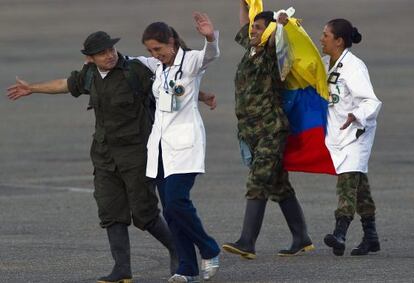FARC rebels release the last of their military and police hostages
"For more than eight years, we were chained together in pairs," says one officer

More than a decade later - suffering from digestive and other minor health problems, but otherwise in good shape - four military and six police officers walked off a helicopter to freedom late Monday night after being held in captivity since the late 1990s by the Revolutionary Armed Forces of Colombia (FARC).
"The officers are here and in good health," said María Cristina Rivera, spokeswoman for the International Committee of the Red Cross, which helped with the rescue. It was the news that Colombians had been waiting to hear since December, when the FARC promised that it would release the men as part of a goodwill gesture to begin a peace process with the Colombian government.
"For more than eight years, we were chained together in pairs," recalled police Sergeant Luis Arturo Arcia, during a news conference 24 hours after being released from nearly 14 years' captivity in the jungle.
Because of the heavy rains, it took more than two hours for a transport plane sent in from Brazil to take off from an airbase in Villavicencio to a secret location in the jungle to pick up the 10 men. The Colombian government didn't take part in the mission and promised not to interfere with the rescue team, which was headed by the ICRC and Piedad Córboba, a controversial former leftist senator who now heads the NGO Colombians for Peace.
"They went back on their word several times, but this time we begged them to keep their promise," said Norma Trujillo, wife of another police sergeant, José Librado Forero, who was held for 12 years and seven months.
During years of negotiations with the then-government of President Andrés Pastrana (1998-2002), Forero would send messages to his family but without describing the ordeal he was going through - chains around his neck, illnesses and wet clothes.
"One time we tried to escape and used a firefly in a jar to light our way through the jungle," Forero said during the news conference. On Wednesday he was expected to celebrate his 20th anniversary with his wife.
After a series of blows, including the ambush deaths of some of its top leaders, the FARC on February 26 announced that it was ending all kidnappings for ransoms. But the families of the 10 also feared that two recent bombing raids of FARC secret camps late last month by Colombian security forces, in which nearly 70 rebels were killed, would jeopardize the scheduled handover.
Ninfa, wife of police sergeant César Lasso, said that she felt all was lost after the spectacular rescue of former presidential candidate Ingrid Betancourt and another group of captives in July 2010. When César was captured on November 1, 1998, their daughter Mónica was 15 months old and Ninfa was pregnant with her son Daniel. "I want to see César but I know that everything will be different. It is not going to be the same because it will be another person coming home," she said.
After peace negotiations broke off in 2002, the FARC stopped releasing evidence of their existence. It was only when an army commando unit in 2009 captured a rebel with the photographs of the kidnapped men that authorities realized that they were still alive.
According to the NGO Free Nation, the FARC still holds some 400 hostages. On Tuesday, Catherine Ashton, the European Union's High Representative for Foreign Affairs and Security Policy, called on the FARC to "immediately and unconditionally free" all of its captives.
Tu suscripción se está usando en otro dispositivo
¿Quieres añadir otro usuario a tu suscripción?
Si continúas leyendo en este dispositivo, no se podrá leer en el otro.
FlechaTu suscripción se está usando en otro dispositivo y solo puedes acceder a EL PAÍS desde un dispositivo a la vez.
Si quieres compartir tu cuenta, cambia tu suscripción a la modalidad Premium, así podrás añadir otro usuario. Cada uno accederá con su propia cuenta de email, lo que os permitirá personalizar vuestra experiencia en EL PAÍS.
¿Tienes una suscripción de empresa? Accede aquí para contratar más cuentas.
En el caso de no saber quién está usando tu cuenta, te recomendamos cambiar tu contraseña aquí.
Si decides continuar compartiendo tu cuenta, este mensaje se mostrará en tu dispositivo y en el de la otra persona que está usando tu cuenta de forma indefinida, afectando a tu experiencia de lectura. Puedes consultar aquí los términos y condiciones de la suscripción digital.








































